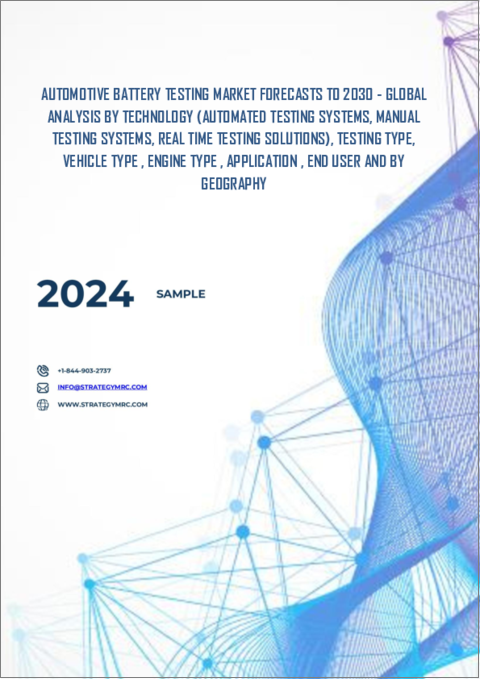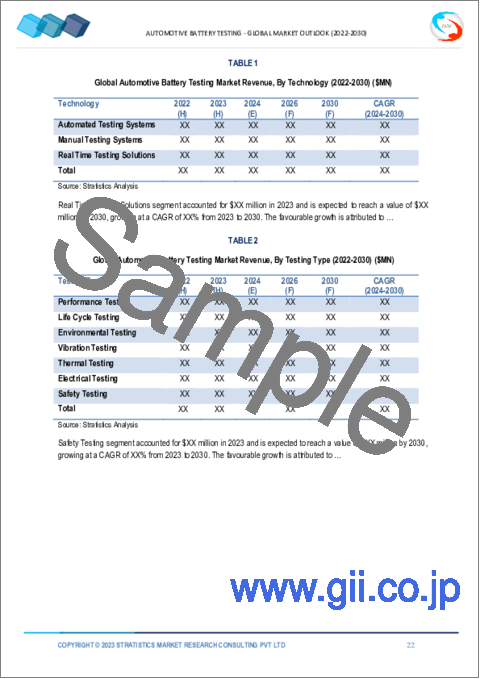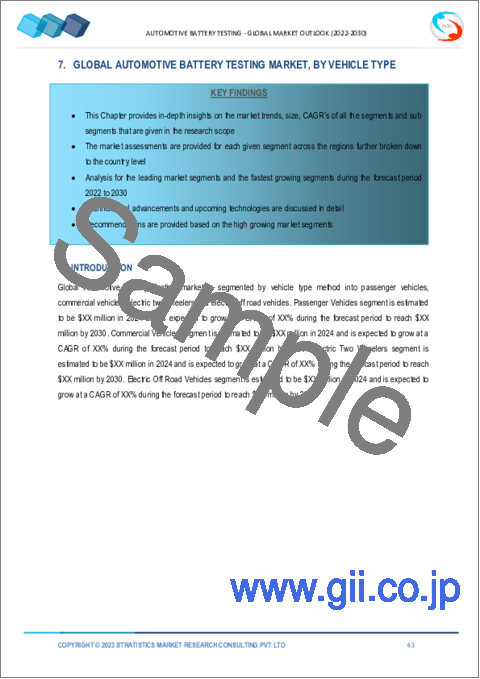|
|
市場調査レポート
商品コード
1569849
自動車用バッテリー試験市場の2030年までの予測: 技術別、試験タイプ別、車両タイプ別、エンジンタイプ別、用途別、エンドユーザー別、地域別の世界分析Automotive Battery Testing Market Forecasts to 2030 - Global Analysis by Technology (Automated Testing Systems, Manual Testing Systems, Real Time Testing Solutions), Testing Type, Vehicle Type, Engine Type, Application, End User and By Geography |
||||||
カスタマイズ可能
|
|||||||
| 自動車用バッテリー試験市場の2030年までの予測: 技術別、試験タイプ別、車両タイプ別、エンジンタイプ別、用途別、エンドユーザー別、地域別の世界分析 |
|
出版日: 2024年10月10日
発行: Stratistics Market Research Consulting
ページ情報: 英文 200+ Pages
納期: 2~3営業日
|
全表示
- 概要
- 図表
- 目次
Stratistics MRCによると、自動車用バッテリー試験の世界市場は2024年に6億6,000万米ドルを占め、予測期間中のCAGRは35.93%で成長し、2030年には41億6,000万米ドルに達すると予測されています。
自動車用バッテリー試験には、自動車、特に電気自動車やハイブリッド車に使用されるバッテリーの性能、安全性、寿命を評価するために設計された一連の手順が含まれます。この試験には、容量、充放電率、熱安定性、サイクル寿命など、さまざまな評価が含まれます。これにより、業界標準や規制要件への適合が保証され、メーカーは配備前に潜在的な問題を特定することができます。実環境をシミュレートすることで、自動車用バッテリー試験は信頼性と消費者の信頼を高め、最終的には電気自動車と持続可能な自動車技術の成長に不可欠な、効率的で安全かつ高性能なバッテリーシステムの開発をサポートします。
高まる電気自動車需要
電気自動車(EV)に対する需要の高まりは、メーカーがバッテリーの性能、安全性、長寿命を確保しようとするため、市場を大幅に押し上げます。EVの普及が進むと、規制基準や消費者の期待に応えるために厳格な試験プロトコルが必要になります。この需要は、試験技術と手法の革新を促し、バッテリーの設計と効率の進歩を促進します。その結果、持続可能な輸送ソリューションへの幅広いシフトに伴い、同市場は投資と成長を加速させています。そのため、市場の成長が促進されます。
複雑な試験要件
複雑な試験要件は、特殊な装置と専門知識を必要とするため、市場に課題をもたらします。多様な電池技術があるため、それぞれに合わせた試験プロトコルが要求され、標準化の努力を複雑にしています。このような複雑さは、コストを増加させ、開発期間を延ばし、製品発売を遅らせる可能性があります。メーカーがこうした要件を満たそうと努力するため、市場全体の成長と技術革新が妨げられ、市場の成長が阻害される可能性があります。
持続可能性への取り組み
持続可能性への取り組みは、環境に優しいバッテリー技術への需要を促進することで、市場に大きな影響を与えています。政府や組織が炭素削減を優先する中、メーカーは効率的でリサイクル可能な電池の開発に注力しています。このシフトに伴い、性能と持続可能性基準への準拠を保証するための強固な試験が必要となります。試験プロトコルの強化は、革新的な材料や設計の採用を促進し、最終的には電池の寿命を向上させ、環境への影響を低減するため、市場の成長を後押しします。
サプライチェーンの混乱
サプライチェーンの混乱は、重要な部品や試験装置の入手に遅れを生じさせ、市場に大きな影響を与えます。このような中断は、新しい電池技術の開発と普及を妨げ、メーカーが市場の需要を満たす能力に影響を与える可能性があります。さらに、混乱が長期化するとコスト増につながり、最終的に電池試験分野全体の成長を鈍化させる。そのため、市場の成長が阻害されます。
COVID-19の影響:
COVID-19はサプライチェーンの中断や研究開発プロジェクトの遅延を引き起こし、自動車用電池試験市場を混乱させました。メーカーが労働力の制限に直面したため、試験スケジュールが影響を受け、電気自動車の新モデルの展開が遅れました。しかし、パンデミックは持続可能な技術への関心を加速させ、電気自動車の需要拡大に伴ってバッテリー試験ソリューションへの長期投資の増加につながった。
予測期間中、熱試験分野が最大となる見込み
様々な温度下でのバッテリーの安全性と性能から、予測期間中は熱試験分野が最大となる見込みです。電気自動車(EV)が普及するにつれ、過熱を防ぎ寿命を延ばすためには熱挙動を理解することが極めて重要になります。厳密な熱試験は潜在的な故障モードの特定に役立ち、安全規制への準拠を確実にし、消費者の信頼を高める。さらに、熱管理技術の進歩は、より効率的なバッテリー設計につながります。
予測期間中、研究開発分野のCAGRが最も高くなる見込み
研究開発分野は、技術革新と試験手法の改善により、予測期間中のCAGRが最も高くなると予想されます。先進的な研究開発努力により、電池の性能、安全性、寿命が向上し、電気自動車(EV)の需要増に対応しています。リアルタイムモニタリングや予測分析などの新しい試験技術は、進化する規格や消費者の期待への適合を保証し、最終的に消費者の信頼を醸成して市場の成長を加速します。
最大のシェアを占める地域
北米は、電気自動車(EV)需要の高まりと持続可能性を推進する政府規制により、予測期間中最大の市場シェアを占めると予測されます。メーカーが安全性、性能、効率を優先させる中、包括的な試験ソリューションは業界標準を満たすために不可欠となっています。また、電池技術の進歩に伴い、信頼性と長寿命を確保するための革新的な試験方法が求められています。こうした品質保証への注力は、消費者の信頼を高めるだけでなく、北米を進化するEV市場のリーダーとして位置づけています。
CAGRが最も高い地域:
アジア太平洋地域は、電気自動車(EV)の普及と規制基準の厳格化により、予測期間中に最も高いCAGRを記録すると予測されます。研究開発への投資が増加し、技術的進歩がバッテリーの性能と安全性を高めています。品質保証に注力することで、メーカーは進化する消費者の期待や規制要件を満たすことができます。さらに、大手自動車メーカーが持続可能な取り組みにシフトしていることから、信頼性の高いバッテリー試験サービス市場は大きな成長が見込まれています。
無料のカスタマイズサービス
本レポートをご購読のお客様には、以下の無料カスタマイズオプションのいずれかをご利用いただけます:
- 企業プロファイル
- 追加市場プレイヤーの包括的プロファイリング(3社まで)
- 主要企業のSWOT分析(3社まで)
- 地域セグメンテーション
- 顧客の関心に応じた主要国の市場推計・予測・CAGR(注:フィージビリティチェックによる)
- 競合ベンチマーキング
- 製品ポートフォリオ、地理的プレゼンス、戦略的提携に基づく主要企業のベンチマーキング
目次
第1章 エグゼクティブサマリー
第2章 序文
- 概要
- ステークホルダー
- 調査範囲
- 調査手法
- データマイニング
- データ分析
- データ検証
- 調査アプローチ
- 調査情報源
- 1次調査情報源
- 2次調査情報源
- 前提条件
第3章 市場動向分析
- 促進要因
- 抑制要因
- 機会
- 脅威
- 技術分析
- 用途分析
- エンドユーザー分析
- 新興市場
- COVID-19の影響
第4章 ポーターのファイブフォース分析
- 供給企業の交渉力
- 買い手の交渉力
- 代替品の脅威
- 新規参入業者の脅威
- 競争企業間の敵対関係
第5章 世界の自動車用バッテリー試験市場:技術別
- 自動テストシステム
- 手動テストシステム
- リアルタイムテストソリューション
第6章 世界の自動車用バッテリー試験市場:試験タイプ別
- パフォーマンス試験
- ライフサイクル試験
- 環境試験
- 振動試験
- 熱試験
- 電気試験
- 安全性試験
第7章 世界の自動車用バッテリー試験市場:車両タイプ別
- 乗用車
- 商用車
- 電動二輪車
- 電動オフロード車
第8章 世界の自動車用バッテリー試験市場:エンジンタイプ別
- ICエンジン
- 電気自動車
第9章 世界の自動車用バッテリー試験市場:用途別
- OEM(オリジナル機器製造業者)試験
- アフターマーケット試験
- 研究開発
- 第三者による試験
- その他の用途
第10章 世界の自動車用バッテリー試験市場:エンドユーザー別
- 自動車メーカー
- バッテリーメーカー
- 政府機関および規制機関
- 大学・研究機関
- その他のエンドユーザー
第11章 世界の自動車用バッテリー試験市場:地域別
- 北米
- 米国
- カナダ
- メキシコ
- 欧州
- ドイツ
- 英国
- イタリア
- フランス
- スペイン
- その他欧州
- アジア太平洋
- 日本
- 中国
- インド
- オーストラリア
- ニュージーランド
- 韓国
- その他アジア太平洋地域
- 南米
- アルゼンチン
- ブラジル
- チリ
- その他南米
- 中東・アフリカ
- サウジアラビア
- アラブ首長国連邦
- カタール
- 南アフリカ
- その他中東とアフリカ
第12章 主な発展
- 契約、パートナーシップ、コラボレーション、合弁事業
- 買収と合併
- 新製品発売
- 事業拡大
- その他の主要戦略
第13章 企業プロファイリング
- Arbin Instruments
- Avicenna
- Ampere Testing
- BioLogic Science Instruments
- Bitrode Corporation
- Chroma ATE Inc.
- CTS Battery Testing
- Dewesoft
- Digatron Power Electronics
- Element Materials Technology
- Fluke Corporation
- HIOKI E.E. Corporation
- Intertek Group plc
- Keysight Technologies
- Kikusui Electronics Corporation
- Landt Instruments
- Maccor, Inc.
- Millbrook Proving Ground
- Neware Technology Limited
- NH Research(NHR)
- PEC(Process-Electronic Corporation)
- ZwickRoell Group
List of Tables
- Table 1 Global Automotive Battery Testing Market Outlook, By Region (2022-2030) ($MN)
- Table 2 Global Automotive Battery Testing Market Outlook, By Technology (2022-2030) ($MN)
- Table 3 Global Automotive Battery Testing Market Outlook, By Automated Testing Systems (2022-2030) ($MN)
- Table 4 Global Automotive Battery Testing Market Outlook, By Manual Testing Systems (2022-2030) ($MN)
- Table 5 Global Automotive Battery Testing Market Outlook, By Real Time Testing Solutions (2022-2030) ($MN)
- Table 6 Global Automotive Battery Testing Market Outlook, By Testing Type (2022-2030) ($MN)
- Table 7 Global Automotive Battery Testing Market Outlook, By Performance Testing (2022-2030) ($MN)
- Table 8 Global Automotive Battery Testing Market Outlook, By Life Cycle Testing (2022-2030) ($MN)
- Table 9 Global Automotive Battery Testing Market Outlook, By Environmental Testing (2022-2030) ($MN)
- Table 10 Global Automotive Battery Testing Market Outlook, By Vibration Testing (2022-2030) ($MN)
- Table 11 Global Automotive Battery Testing Market Outlook, By Thermal Testing (2022-2030) ($MN)
- Table 12 Global Automotive Battery Testing Market Outlook, By Electrical Testing (2022-2030) ($MN)
- Table 13 Global Automotive Battery Testing Market Outlook, By Safety Testing (2022-2030) ($MN)
- Table 14 Global Automotive Battery Testing Market Outlook, By Vehicle Type (2022-2030) ($MN)
- Table 15 Global Automotive Battery Testing Market Outlook, By Passenger Vehicles (2022-2030) ($MN)
- Table 16 Global Automotive Battery Testing Market Outlook, By Commercial Vehicles (2022-2030) ($MN)
- Table 17 Global Automotive Battery Testing Market Outlook, By Electric Two Wheelers (2022-2030) ($MN)
- Table 18 Global Automotive Battery Testing Market Outlook, By Electric Off Road Vehicles (2022-2030) ($MN)
- Table 19 Global Automotive Battery Testing Market Outlook, By Engine Type (2022-2030) ($MN)
- Table 20 Global Automotive Battery Testing Market Outlook, By IC Engine (2022-2030) ($MN)
- Table 21 Global Automotive Battery Testing Market Outlook, By Electric Vehicle (2022-2030) ($MN)
- Table 22 Global Automotive Battery Testing Market Outlook, By Application (2022-2030) ($MN)
- Table 23 Global Automotive Battery Testing Market Outlook, By Original Equipment Manufacturers (OEMs) Test (2022-2030) ($MN)
- Table 24 Global Automotive Battery Testing Market Outlook, By Aftermarket Testing (2022-2030) ($MN)
- Table 25 Global Automotive Battery Testing Market Outlook, By Research & Development (2022-2030) ($MN)
- Table 26 Global Automotive Battery Testing Market Outlook, By Third Party Testing (2022-2030) ($MN)
- Table 27 Global Automotive Battery Testing Market Outlook, By Other Applications (2022-2030) ($MN)
- Table 28 Global Automotive Battery Testing Market Outlook, By End User (2022-2030) ($MN)
- Table 29 Global Automotive Battery Testing Market Outlook, By Automotive Manufacturers (2022-2030) ($MN)
- Table 30 Global Automotive Battery Testing Market Outlook, By Battery Manufacturers (2022-2030) ($MN)
- Table 31 Global Automotive Battery Testing Market Outlook, By Government Agencies & Regulatory Bodies (2022-2030) ($MN)
- Table 32 Global Automotive Battery Testing Market Outlook, By Universities & Research Institutions (2022-2030) ($MN)
- Table 33 Global Automotive Battery Testing Market Outlook, By Other End Users (2022-2030) ($MN)
Note: Tables for North America, Europe, APAC, South America, and Middle East & Africa Regions are also represented in the same manner as above.
According to Stratistics MRC, the Global Automotive Battery Testing Market is accounted for $0.66 billion in 2024 and is expected to reach $4.16 billion by 2030 growing at a CAGR of 35.93% during the forecast period. Automotive battery testing involves a series of procedures designed to evaluate the performance, safety, and longevity of batteries used in vehicles, particularly electric and hybrid models. This testing encompasses various assessments, including capacity, charge and discharge rates, thermal stability, and cycle life. It ensures compliance with industry standards and regulatory requirements, helping manufacturers identify potential issues before deployment. By simulating real-world conditions, automotive battery testing enhances reliability and consumer confidence, ultimately supporting the development of efficient, safe, and high-performing battery systems that are critical for the growth of electric vehicles and sustainable automotive technologies.
Market Dynamics:
Driver:
Growing Demand Electric Vehicles
Growing demand for electric vehicles (EVs) significantly boosts the market, as manufacturers seek to ensure battery performance, safety, and longevity. Increased EV adoption necessitates rigorous testing protocols to meet regulatory standards and consumer expectations. This demand drives innovation in testing technologies and methodologies, fostering advancements in battery design and efficiency. Consequently, the market experiences heightened investment and growth, aligning with the broader shift towards sustainable transportation solutions. Thus, it drives the growth of the market.
Restraint:
Complex Testing Requirements
Complex testing requirements pose challenges in the market by necessitating specialized equipment and expertise. The diverse range of battery technologies demands tailored testing protocols, complicating standardization efforts. This complexity can increase costs and extend development timelines, potentially delaying product launches. As manufacturers strive to meet these requirements, it may hinder overall market growth and innovation, thus it hinders the growth of the market.
Opportunity:
Sustainability Initiatives
Sustainability initiatives are profoundly impacting the market by driving demand for environmentally friendly battery technologies. As governments and organizations prioritize carbon reduction, manufacturers focus on developing efficient, recyclable batteries. This shift necessitates robust testing to ensure performance and compliance with sustainability standards. Enhanced testing protocols facilitate the adoption of innovative materials and designs, ultimately improving battery longevity and reducing environmental impact, thus it boosts the growth of the market.
Threat:
Supply Chain Disruptions
Supply chain disruptions significantly impact the market by causing delays in obtaining critical components and testing equipment. Such interruptions can hinder the development and rollout of new battery technologies, affecting manufacturers' ability to meet market demand. Additionally, prolonged disruptions can lead to increased costs, ultimately slowing the overall growth of the battery testing sector. Thus, it hampers the growth of the market.
Covid-19 Impact:
COVID-19 disrupted the automotive battery testing market by causing supply chain interruptions and delays in R&D projects. As manufacturers faced workforce restrictions, testing schedules were affected, slowing down the rollout of new electric vehicle models. However, the pandemic also accelerated interest in sustainable technologies, leading to increased long-term investment in battery testing solutions as demand for electric vehicles grew.
The thermal testing segment is expected to be the largest during the forecast period
The thermal testing segment is expected to be the largest during the forecast period owing to battery safety and performance under varying temperatures. As electric vehicles (EVs) become more prevalent, understanding thermal behaviour is crucial to prevent overheating and enhance longevity. Rigorous thermal testing helps identify potential failure modes, ensuring compliance with safety regulations and improving consumer confidence. Additionally, advancements in thermal management technologies can lead to more efficient battery designs.
The research & development segment is expected to have the highest CAGR during the forecast period
The research & development segment is expected to have the highest CAGR during the forecast period due to innovation and improving testing methodologies. Advanced R&D efforts enhance battery performance, safety, and longevity, aligning with the growing demand for electric vehicles (EVs). New testing techniques, such as real-time monitoring and predictive analytics, ensure compliance with evolving standards and consumer expectations, ultimately fostering consumer confidence and accelerating market growth.
Region with largest share:
North America is projected to hold the largest market share during the forecast period due to rising demand for electric vehicles (EVs) and government regulations promoting sustainability. As manufacturers prioritize safety, performance, and efficiency, comprehensive testing solutions become essential to meet industry standards. Advances in battery technology also require innovative testing methods to ensure reliability and longevity. This focus on quality assurance not only boosts consumer confidence but also positions North America as a leader in the evolving EV market.
Region with highest CAGR:
Asia Pacific is projected to witness the highest CAGR over the forecast period owing to region's growing electric vehicle (EV) adoption and stringent regulatory standards. Increased investment in R&D and technological advancements enhance battery performance and safety. This focus on quality assurance helps manufacturers meet evolving consumer expectations and regulatory requirements. Additionally, as major automakers shift towards sustainable practices, the market for reliable battery testing services is expected to experience significant growth.
Key players in the market
Some of the key players in Automotive Battery Testing Market include Arbin Instruments, Avicenna, Ampere Testing, BioLogic Science Instruments, Bitrode Corporation, Chroma ATE Inc., CTS Battery Testing, Dewesoft, Digatron Power Electronics, Element Materials Technology, Fluke Corporation, HIOKI E.E. Corporation, Intertek Group plc, Keysight Technologies, Kikusui Electronics Corporation, Landt Instruments, Maccor, Inc., Millbrook Proving Ground, Neware Technology Limited, NH Research (NHR), PEC (Process-Electronic Corporation) and ZwickRoell Group.
Key Developments:
In September 2024, Intertek announced the expansion of its New Plymouth laboratory's testing capabilities to include full specification analysis of Animal Fats (AF) and Used Cooking Oils (UCO). This enhancement makes New Plymouth the only laboratory in New Zealand capable of providing comprehensive testing for these critical materials, which are key inputs in the production of biofuels.
In May 2024, Intertek announce the launch of iCare in Bangladesh to support the local textile industry by offering a seamless and pioneering solution for managing testing processes from start to finish.
In April 2024, Intertek Expands Services to Include Auditing to ISO/IEC 42001:2023 Artificial Intelligence Management Systems (AIMS).
Technologies Covered:
- Automated Testing Systems
- Manual Testing Systems
- Real Time Testing Solutions
Testing Types Covered:
- Performance Testing
- Life Cycle Testing
- Environmental Testing
- Vibration Testing
- Thermal Testing
- Electrical Testing
- Safety Testing
Vehicle Types Covered:
- Passenger Vehicles
- Commercial Vehicles
- Electric Two Wheelers
- Electric Off Road Vehicles
Engine Types Covered:
- IC Engine
- Electric Vehicle
Applications Covered:
- Original Equipment Manufacturers (OEMs) Test
- Aftermarket Testing
- Research & Development
- Third Party Testing
- Other Applications
End Users Covered:
- Automotive Manufacturers
- Battery Manufacturers
- Government Agencies & Regulatory Bodies
- Universities & Research Institutions
- Other End Users
Regions Covered:
- North America
- US
- Canada
- Mexico
- Europe
- Germany
- UK
- Italy
- France
- Spain
- Rest of Europe
- Asia Pacific
- Japan
- China
- India
- Australia
- New Zealand
- South Korea
- Rest of Asia Pacific
- South America
- Argentina
- Brazil
- Chile
- Rest of South America
- Middle East & Africa
- Saudi Arabia
- UAE
- Qatar
- South Africa
- Rest of Middle East & Africa
What our report offers:
- Market share assessments for the regional and country-level segments
- Strategic recommendations for the new entrants
- Covers Market data for the years 2022, 2023, 2024, 2026, and 2030
- Market Trends (Drivers, Constraints, Opportunities, Threats, Challenges, Investment Opportunities, and recommendations)
- Strategic recommendations in key business segments based on the market estimations
- Competitive landscaping mapping the key common trends
- Company profiling with detailed strategies, financials, and recent developments
- Supply chain trends mapping the latest technological advancements
Free Customization Offerings:
All the customers of this report will be entitled to receive one of the following free customization options:
- Company Profiling
- Comprehensive profiling of additional market players (up to 3)
- SWOT Analysis of key players (up to 3)
- Regional Segmentation
- Market estimations, Forecasts and CAGR of any prominent country as per the client's interest (Note: Depends on feasibility check)
- Competitive Benchmarking
- Benchmarking of key players based on product portfolio, geographical presence, and strategic alliances
Table of Contents
1 Executive Summary
2 Preface
- 2.1 Abstract
- 2.2 Stake Holders
- 2.3 Research Scope
- 2.4 Research Methodology
- 2.4.1 Data Mining
- 2.4.2 Data Analysis
- 2.4.3 Data Validation
- 2.4.4 Research Approach
- 2.5 Research Sources
- 2.5.1 Primary Research Sources
- 2.5.2 Secondary Research Sources
- 2.5.3 Assumptions
3 Market Trend Analysis
- 3.1 Introduction
- 3.2 Drivers
- 3.3 Restraints
- 3.4 Opportunities
- 3.5 Threats
- 3.6 Technology Analysis
- 3.7 Application Analysis
- 3.8 End User Analysis
- 3.9 Emerging Markets
- 3.10 Impact of Covid-19
4 Porters Five Force Analysis
- 4.1 Bargaining power of suppliers
- 4.2 Bargaining power of buyers
- 4.3 Threat of substitutes
- 4.4 Threat of new entrants
- 4.5 Competitive rivalry
5 Global Automotive Battery Testing Market, By Technology
- 5.1 Introduction
- 5.2 Automated Testing Systems
- 5.3 Manual Testing Systems
- 5.4 Real Time Testing Solutions
6 Global Automotive Battery Testing Market, By Testing Type
- 6.1 Introduction
- 6.2 Performance Testing
- 6.3 Life Cycle Testing
- 6.4 Environmental Testing
- 6.5 Vibration Testing
- 6.6 Thermal Testing
- 6.7 Electrical Testing
- 6.8 Safety Testing
7 Global Automotive Battery Testing Market, By Vehicle Type
- 7.1 Introduction
- 7.2 Passenger Vehicles
- 7.3 Commercial Vehicles
- 7.4 Electric Two Wheelers
- 7.5 Electric Off Road Vehicles
8 Global Automotive Battery Testing Market, By Engine Type
- 8.1 Introduction
- 8.2 IC Engine
- 8.3 Electric Vehicle
9 Global Automotive Battery Testing Market, By Application
- 9.1 Introduction
- 9.2 Original Equipment Manufacturers (OEMs) Test
- 9.3 Aftermarket Testing
- 9.4 Research & Development
- 9.5 Third Party Testing
- 9.6 Other Applications
10 Global Automotive Battery Testing Market, By End User
- 10.1 Introduction
- 10.2 Automotive Manufacturers
- 10.3 Battery Manufacturers
- 10.4 Government Agencies & Regulatory Bodies
- 10.5 Universities & Research Institutions
- 10.6 Other End Users
11 Global Automotive Battery Testing Market, By Geography
- 11.1 Introduction
- 11.2 North America
- 11.2.1 US
- 11.2.2 Canada
- 11.2.3 Mexico
- 11.3 Europe
- 11.3.1 Germany
- 11.3.2 UK
- 11.3.3 Italy
- 11.3.4 France
- 11.3.5 Spain
- 11.3.6 Rest of Europe
- 11.4 Asia Pacific
- 11.4.1 Japan
- 11.4.2 China
- 11.4.3 India
- 11.4.4 Australia
- 11.4.5 New Zealand
- 11.4.6 South Korea
- 11.4.7 Rest of Asia Pacific
- 11.5 South America
- 11.5.1 Argentina
- 11.5.2 Brazil
- 11.5.3 Chile
- 11.5.4 Rest of South America
- 11.6 Middle East & Africa
- 11.6.1 Saudi Arabia
- 11.6.2 UAE
- 11.6.3 Qatar
- 11.6.4 South Africa
- 11.6.5 Rest of Middle East & Africa
12 Key Developments
- 12.1 Agreements, Partnerships, Collaborations and Joint Ventures
- 12.2 Acquisitions & Mergers
- 12.3 New Product Launch
- 12.4 Expansions
- 12.5 Other Key Strategies
13 Company Profiling
- 13.1 Arbin Instruments
- 13.2 Avicenna
- 13.3 Ampere Testing
- 13.4 BioLogic Science Instruments
- 13.5 Bitrode Corporation
- 13.6 Chroma ATE Inc.
- 13.7 CTS Battery Testing
- 13.8 Dewesoft
- 13.9 Digatron Power Electronics
- 13.10 Element Materials Technology
- 13.11 Fluke Corporation
- 13.12 HIOKI E.E. Corporation
- 13.13 Intertek Group plc
- 13.14 Keysight Technologies
- 13.15 Kikusui Electronics Corporation
- 13.16 Landt Instruments
- 13.17 Maccor, Inc.
- 13.18 Millbrook Proving Ground
- 13.19 Neware Technology Limited
- 13.20 NH Research (NHR)
- 13.21 PEC (Process-Electronic Corporation)
- 13.22 ZwickRoell Group






